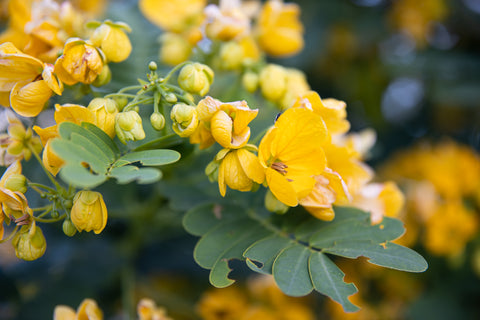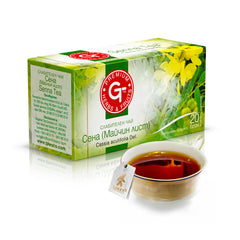Senna Plant Benefits, Uses & Risks
Mother leaf, Senna, Cassia (Cassia acutifolia, Senna alexandrina) is a subshrub or shrub belonging to the Legume family (Leguminosae / Fabaceae). It is also found under the name Senemikia.
The herb reaches a height of up to 1 meter, in rare cases up to 2 m. The stem is erect, smooth, pale green in color. The branches are long, widely spreading on all sides. The leaves are pinnate, compound, consisting of lanceolate or oval-elliptic leaflets. The petals are 2-3 cm long and 5-10 mm wide. The foliage is gray-green. It has a weak specific smell, is sticky and has a sweetish taste.
The flowers of cassia are colored yellow, collected in racemes, which are located on long stalks in the axils of the leaves. Their flowering spans the months from July to October. The fruit of the mother leaf is a dry, leathery pod (bean) colored brown. It is 3 to 5 cm long and 1.5-2.5 cm wide. It contains about six flat seeds.

Distribution of mother leaf
Cassia is native to the desert and semi-desert regions of South Arabia and Africa. It is also found as a cultivated plant. It is cultivated in Asia and Africa.
Usable portion of mother leaf
The usable parts of the herb are its leaves and fruits.
Chemical composition of mother leaf
The leaf mass of senna contains free anthraquinones, anthraquinone and resin glycosides, anthranol glycosides, aglycones (cenidines, aloeemodin, chrysophanol), kaempferol, pimit, mucilage, resinous substances, tartrates, rhein, isoemodin, aloeemodin, chrysophanol, flavonoids, bitter substances, acids and others. Lower amounts of free anthraquinones are found in fruits than in leaves.
Medicinal properties and application of motherwort
The current use of mother-of-pearl dates back to around the 1950s. Different types of senna were used by ancient peoples as a laxative. The first written evidence of the use of the herb dates back to the 9th century BC. and belong to Arab doctors. The Cherokee tribe pounded senna root, steeped it in water, and used it as a dressing for wounds. Motherwort has also historically been used for fever conditions.
The herb received the name purgative in Europe in the Middle Ages because it was widely used as a purgative in an Italian medical school. Its stimulating effect on intestinal peristalsis has been established. It manifests itself 10 hours after its intake, expressing itself in stopping the absorption of water in the large intestine. Prolonged use of senna reduced its effect.
The action of the leaves and the fruit of the mother leaf is painless, soft, which makes them suitable for use in patients with liver diseases, seriously ill, people suffering from hemorrhoids.

Properties of senna
- diuretic;
- cleansing.
- Finds application in
- colitis;
- hemorrhoids;
- lazy bowels;
- constipation; chronic constipation;
- obesity;
- liver diseases;
- constipation induced by the use of morphine;
- postoperative constipation;
- as a laxative for terminally ill cancer patients.
The herb is sometimes used for various types of dermatitis and ophthalmic problems. It is also used in preparation for colonoscopy and urography.
Uses of Motherwort in Ayurvedic Medicine
- constipation
- skin problems
- jaundice
- liver problems
- bronchitis
- anemia
- Typhoid Fever
An interesting application of it in Chinese medicine is atherosclerosis, in addition to liver problems and constipation.
In Latin America, syrup from cassia flowers and the fleshy parts of its seeds are consumed as a laxative. Juice is also taken for urinary problems.
Method of application of Senna
The leaf mass of the mother leaf is used in making tablets available in the pharmacy network. Senna is also available in tea form and as a dietary supplement. It is also included in weight loss medications.
decoction - one tablespoon of leaves or fruits are boiled in 200 milliliters of water, 5 minutes. The decoction is drunk in the evening before going to bed.
cold extract of senna - one tablespoon of well-ground leaves are soaked in a glass of water. They stay like that one night. The resulting mixture is filtered in the morning and drunk.
extract - twelve tablespoons of chopped fruit are soaked in 300 ml. water, for one evening. In the morning, strain and drink half of the extract on an empty stomach. The other half can be drunk in the evening.
Tinctures of senna are used for very long constipation. An excellent means of quickly cleansing the gastrointestinal tract is the combination of senna with cinnamon, ginger or fennel.
Motherwort cleanses the digestive tract of worms.
The resulting liquid from senna, by boiling, very often causes colic. This is due to the reduced anthraquinones or resinous substances extracted from it. Therefore, it is recommended to avoid this method of preparation.
Harmful effects of using mother-of-pearl
The herb should not be taken for more than 10 days without a break. Its long-term use can lead to weakening of the intestinal muscles, cardiac arrhythmia, deterioration of the bone structure, electrolyte imbalances, weight loss.
Side effects from taking senna: cramps, colic, manifestations of hypersensitivity. In case of overdose, nausea, vomiting, mucous diarrhea, abdominal pain, dehydration, flatulence, hypotension may occur.
Attention!
Not to be used by pregnant women, as it may cause abortion - its use is strictly prohibited.
Not to be taken by children under 2 years of age. Strictly follow the prescribed dosage and method of administration. Do not use in case of intestinal obstruction, acute inflammation of the intestine, appendicitis. Avoid in diverticulitis, colitis, ulcers and other similar intestinal disorders. The herb may cause colic.
Motherwort should not be combined with antiarrhythmic drugs.
Every single intake of maternity leave should be consulted with a doctor.]
Leave a comment
Comments will be approved before showing up.






